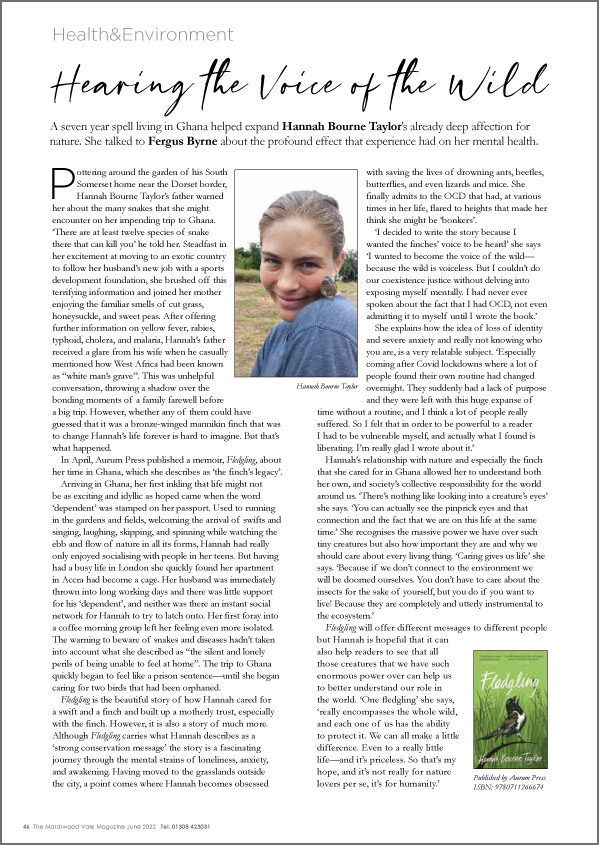
A seven-year spell living in Ghana helped expand Hannah Bourne Taylor’s already deep affection for nature. She talked to Fergus Byrne about the profound effect that experience had on her mental health.
Pottering around the garden of his South Somerset home near the Dorset border, Hannah Bourne Taylor’s father warned her about the many snakes that she might encounter on her impending trip to Ghana. ‘There are at least twelve species of snake there that can kill you’ he told her. Steadfast in her excitement at moving to an exotic country to follow her husband’s new job with a sports development foundation, she brushed off this terrifying information and joined her mother enjoying the familiar smells of cut grass, honeysuckle, and sweet peas. After offering further information on yellow fever, rabies, typhoid, cholera, and malaria, Hannah’s father received a glare from his wife when he casually mentioned how West Africa had been known as “white man’s grave”. This was unhelpful conversation, throwing a shadow over the bonding moments of a family farewell before a big trip. However, whether any of them could have guessed that it was a bronze-winged mannikin finch that was to change Hannah’s life forever is hard to imagine. But that’s what happened.
In April, Aurum Press published a memoir, Fledgling, about her time in Ghana, which she describes as ‘the finch’s legacy’.
Arriving in Ghana, her first inkling that life might not be as exciting and idyllic as hoped came when the word ‘dependent’ was stamped on her passport. Used to running in the gardens and fields, welcoming the arrival of swifts and singing, laughing, skipping, and spinning while watching the ebb and flow of nature in all its forms, Hannah had really only enjoyed socialising with people in her teens. But having had a busy life in London she quickly found her apartment in Accra had become a cage. Her husband was immediately thrown into long working days and there was little support for his ‘dependent’, and neither was there an instant social network for Hannah to try to latch onto. Her first foray into a coffee morning group left her feeling even more isolated. The warning to beware of snakes and diseases hadn’t taken into account what she described as “the silent and lonely perils of being unable to feel at home”. The trip to Ghana quickly began to feel like a prison sentence—until she began caring for two birds that had been orphaned.
Fledgling is the beautiful story of how Hannah cared for a swift and a finch and built up a motherly trust, especially with the finch. However, it is also a story of much more. Although Fledgling carries what Hannah describes as a ‘strong conservation message’ the story is a fascinating journey through the mental strains of loneliness, anxiety, and awakening. Having moved to the grasslands outside the city, a point comes where Hannah becomes obsessed with saving the lives of drowning ants, beetles, butterflies, and even lizards and mice. She finally admits to the OCD that had, at various times in her life, flared to heights that made her think she might be ‘bonkers’.
‘I decided to write the story because I wanted the finches’ voice to be heard’ she says ‘I wanted to become the voice of the wild—because the wild is voiceless. But I couldn’t do our coexistence justice without delving into exposing myself mentally. I had never ever spoken about the fact that I had OCD, not even admitting it to myself until I wrote the book.’
She explains how the idea of loss of identity and severe anxiety and really not knowing who you are, is a very relatable subject. ‘Especially coming after Covid lockdowns where a lot of people found their own routine had changed overnight. They suddenly had a lack of purpose and they were left with this huge expanse of time without a routine, and I think a lot of people really suffered. So I felt that in order to be powerful to a reader I had to be vulnerable myself, and actually what I found is liberating. I’m really glad I wrote about it.’
Hannah’s relationship with nature and especially the finch that she cared for in Ghana allowed her to understand both her own, and society’s collective responsibility for the world around us. ‘There’s nothing like looking into a creature’s eyes’ she says. ‘You can actually see the pinprick eyes and that connection and the fact that we are on this life at the same time.’ She recognises the massive power we have over such tiny creatures but also how important they are and why we should care about every living thing. ‘Caring gives us life’ she says. ‘Because if we don’t connect to the environment we will be doomed ourselves. You don’t have to care about the insects for the sake of yourself, but you do if you want to live! Because they are completely and utterly instrumental to the ecosystem.’
Fledgling will offer different messages to different people but Hannah is hopeful that it can also help readers to see that all those creatures that we have such enormous power over can help us to better understand our role in the world. ‘One fledgling’ she says, ‘really encompasses the whole wild, and each one of us has the ability to protect it. We can all make a little difference. Even to a really little life—and it’s priceless. So that’s my hope, and it’s not really for nature lovers per se, it’s for humanity.’




